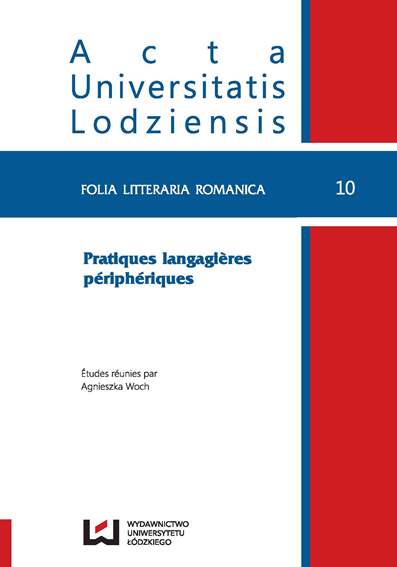Stratégies médiatiques et communication citoyenne: un clivage dans l’expression de l’émotion
DOI:
https://doi.org/10.18778/1505-9065.10.08Słowa kluczowe:
Expression des émotions, stratégies médiatiques, pratiques communicatives citoyennes, euphémisme, dysphémismeAbstrakt
L’analyse de différents modes de médiatisation de l’émotion permet d’observer un clivage profond entre les stratégies discursives des professionnels des médias, surtout des journalistes, et les pratiques communicatives citoyennes. Quand il s’agit de verbaliser les émotions, le discours journalistique foisonne d’euphémismes tandis que la prise de parole par les internautes s’accompagne à tout bout de champ, ou presque, de dysphémismes. Pour illustrer cette situation, nous nous sommes proposé de comparer les commentaires de journalistes professionnels et d’internautes (« simples citoyens ») émis en réaction au comportement du footballeur français Samir Nasri lequel, en insultant par deux fois un journaliste lors des championnats Euro 2012, a suscité de vives émotions que chacun des deux groupes a verbalisées à sa façon.
Pobrania
Bibliografia
Bonhomme Marc, Pragmatique des figures du discours, Paris, Champion, 2005
Google Scholar
Bottineau Didier, « OUPS ! Les émotimots, les petits mots des émotions : des acteurs majeurs de la cognition verbale interactive », Langue française, 2013, no 4 (180), p. 99–112
Google Scholar
DOI: https://doi.org/10.3917/lf.180.0099
Burgoon Judee K., « Interpersonal expectations, expectancy violations, and emotional communication », Journal of Language and Social Psychology, 1993, no 12, p. 13–21
Google Scholar
DOI: https://doi.org/10.1177/0261927X93121003
Charaudeau Patrick, Les médias et l’information. L’impossible transparence du discours, Louvain-La-Neuve, De Boeck-Ina, 2005
Google Scholar
Charaudeau Patrick, « Discours journalistique et positionnements énonciatifs. Frontières et dérives », Semen. Revue de sémio-linguistique des textes et discours, 2006, no 22, URL : http://semen.revues.org/2793 (19.11.2015)
Google Scholar
DOI: https://doi.org/10.4000/semen.2793
Casas Gómez Miguel, La interdicción lingüística. Mecanismos del eufemismo y disfemismo, Cádiz, Servicio de Publicaciones de la Universidad de Cádiz, 1986
Google Scholar
Crespo Fernández Eliecer, El eufemismo y el disfemismo. Procesos de manipulación del tabú en el lenguaje literario inglés, Alicante, Publicaciones de la Universidad de Alicante, 2007
Google Scholar
Jaubert Anna, « Dire et plus ou moins dire. Analyse pragmatique de l’euphémisme et de la litote », Langue française, 2008, no 160, p. 105–116
Google Scholar
DOI: https://doi.org/10.3406/lfr.2008.6710
Kerbrat-Orecchioni Catherine, « Quelle place pour les émotions dans la linguistique du XXe siècle ? », in Les émotions dans les interactions, éd. Ch. Plantin, M. Doury & D. Traverso, Lyon, P.U.L., 2000, p. 33–74
Google Scholar
Kerbrat-Orecchioni Catherine, « L’impolitesse en interaction : Aperçus théoriques et étude de cas », Lexis Special [Impoliteness / Impolitesse] 2010, no 2, p. 35–60
Google Scholar
DOI: https://doi.org/10.4000/lexis.796
López Díaz Montserrat, « Quand dire, c’est édulcorer et occulter : l’euphémisme dans l’information médiatique », Journal of French Language Studies, 2013, 23. URL : http://journals.cambridge.org/abstract_S0959269512000269 (19.11.2015)
Google Scholar
DOI: https://doi.org/10.1017/S0959269512000269
López Díaz Montserrat, « L’euphémisme, la langue de bois et le politiquement correct : changements linguistiques et stratégies énonciatives », L’Information grammaticale, 2014, no 143, p. 47–55
Google Scholar
Muntéano Basil, « Les implications esthétiques de l’euphémisme en France au XVIIIe siècle », Cahiers de l’Association internationale des Études françaises, 1953, no 3–4–5, p. 153–166
Google Scholar
DOI: https://doi.org/10.3406/caief.1953.2028
Pobrania
Opublikowane
Jak cytować
Numer
Dział
Licencja
Prawa autorskie (c) 2015 Agnieszka Konowska

Utwór dostępny jest na licencji Creative Commons Uznanie autorstwa – Użycie niekomercyjne – Bez utworów zależnych 4.0 Międzynarodowe.













